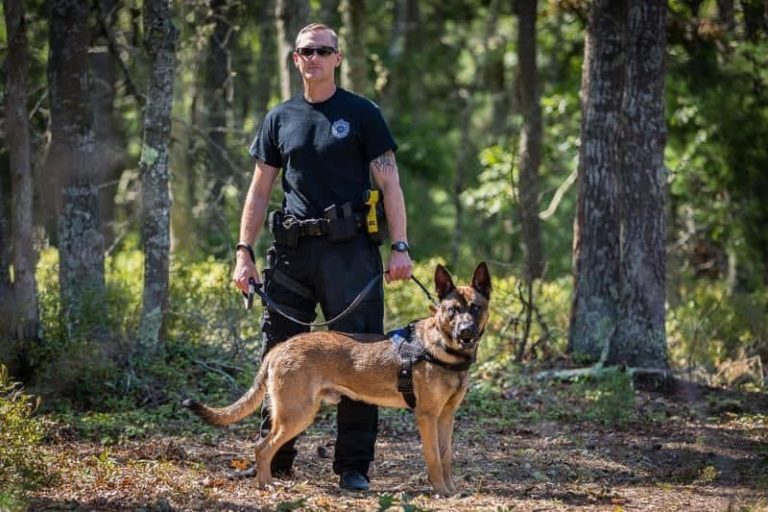Police K9’s Job Ready
In Foxborough, Mass., K9 Drax received an officer’s send-off. Members of the Foxborough police and fire departments saluted the retired 3-year-old as he took his final ride with Officer Kurt Pollister. K9 Drax, a German/Dutch shepherd mix, suffered from an aggressive brain tumor. “Rest easy, Drax. Thank you for your dedicated service. We have the watch from here,” police posted on Facebook.
This show of admiration for an animal might strike some as odd in a world adrift in problems. Yet, the K9 units embedded in police forces across Massachusetts are far from a humanitarian indulgence: they are a 100-year investment in a resource that expands and reinforces the good police do across a community.
In the words of the Stanton Foundation, a major provider of grants to purchase and establish K9 units, they are a “force multiplier.”
id=”attachment_2318″ align=”alignright” width=”454″] K9 Drax of the Foxborough Police Department[/caption]
Police canines’ duties grow and change with community needs.
In their daily shifts, K9’s frequently wear bulletproof vests and accompany their handlers into dangerous, unpredictable situations. Depending on their training and certifications, a canine on patrol may search buildings, track lost children, locate firearms, or pin down narcotics traffickers.
Today, a shelter dog could as easily be a part of a comfort dog program, where a loving, friendly animal is a source of solace for individuals during times of crisis. In the Greenfield, MA Police Department, these comfort animals have accompanied children through funerals, and distracted families as their homes burned. They become the one lasting positive memory of an otherwise horrific situation.
K9 Training: experts in their field
Many police force K9’s are bred in Europe and are an expensive investment. It can cost upwards of $30,000 to purchase and fully train a single K9 unit. The stalwart and intelligent German Shepherds, Dutch Shepherds, Labradors, and Belgian Malinois are the most common breeds employed. Their career begins at about 16 months of age after a careful selection process.
Once chosen, K9s enter a nationally certified training center, such as the Boston Police K-9 Academy’s Patrol Dog School. Here the dogs go through 14 weeks of daily high-level, disciplined preparation with their new handler, the officer who will become their life partner. Most animal units are cross-trained in narcotics, but all are expected to become experts in either a single-purpose or dual-purpose specialization.
For example, a dog specializing in Explosive Ordinance Detection recognizes more than 20 different types of explosive odors and notifies his handler upon finding them. As reported by the City of Revere Police Department, this particular dog “is also trained to search for missing persons, fleeing suspects, or those in hiding. He is trained in both building- and open area searches, as well as suspect apprehension and handler protection. “
The K9 team
The bond that grows between K9 teams is a strong and powerful one. The dogs serve at their handlers’ command, living with them and their families. It is a full-house, 24/7 commitment with every member on board.
The pair will work, train, and live together for the duration of the dog’s life. The officer is responsible for all his care and must exercise him daily. While the K9 is an officer, his partner maintains control over his behavior at all times. Theirs is a working relationship built on mutual trust and respect.
An average K9 retires at about 9 years of age, providing about seven years of working life. They don’t become “house pets” until retirement, when the interaction between the two relaxes and becomes playful.
Handling a K9 carries a special responsibility for a patrol officer. In addition to his or her duties, the officer must lead and command a highly trained, prospectively aggressive animal. Any mistake on their part can result in injury, potential harm, and possible litigation as an uninformed public points fingers at the dog’s “owner.” Additionally, their partnership with an animal capable of sniffing out bombs or tracking down bad guys inherently drives them into high-risk situations – there are no easy duties when you’re a K9 team.
Despite the risks and added stress, K9 officers love their dogs and the challenge of keeping such a smart and eager animal ready for service. In return, they receive the protection and loyalty from a being whose entire life is dedicated to public service.
Serving the Community
When a police officer or firefighter dies, in many cases, their paycheck and insurance stop before their death benefits begin, which is where the Hundred Club steps in to help. Your generosity provides immediate support to the families of these everyday heroes; funds they can rely upon to pay rent, groceries, and other bills. Help us continue the tradition of caring for those who care for us. Donate to the Survivor’s Fund: https://100clubmass.org/donate/

